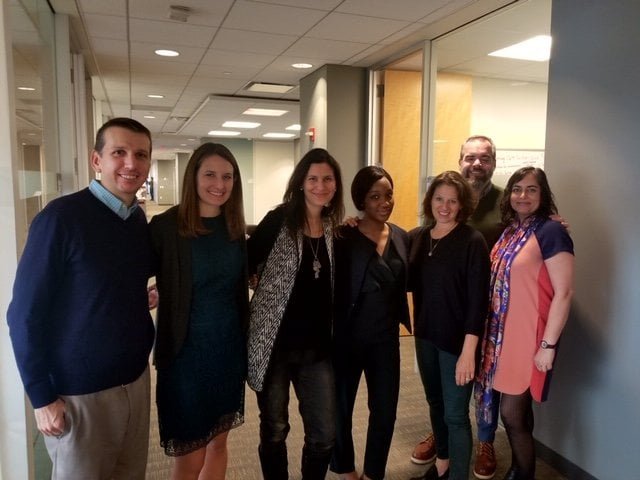Better Than Most is a regular feature of The Business of Giving, examining the best places to work among social good businesses and nonprofit organizations.
Denver: Tonight we’ll be going up to Boston to visit a pioneering venture philanthropy organization by the name of New Profit. We’ll begin with a brief description of what they do and then you’ll hear why members of the team find it to be such a special place to work.
Sam: New Profit is a venture philanthropy organization. We provide unrestricted funding and strategic support to a portfolio of social entrepreneurs who are really trying to change the systems in which they work. That covers education, early childhood development, some workforce development, health, criminal justice.
 Kim: Fundamentally, we think about our portfolio investing differently, and we apply an equity, diversity, and inclusion lens to all of those choices. We think a lot about the meaning of proximity and the reality that a lot of the most powerful insights not just into how to solve problems but the assets that are available to solve problems are in the communities that we’re all looking out and funding and identifying leaders. That we’ve had some really big shifts on the way we think about our own investment selection process, our pipeline. It’s changed our staff team. I think we had an espoused commitment to diversity and inclusion from the very beginning but our ability to really enact it was really limited. I think again, we have a ways to go. When I look around the room at New Profit now compared to only a few years ago, it’s extraordinary and incredibly moving to me to see how much progress we’ve been able to make.
Kim: Fundamentally, we think about our portfolio investing differently, and we apply an equity, diversity, and inclusion lens to all of those choices. We think a lot about the meaning of proximity and the reality that a lot of the most powerful insights not just into how to solve problems but the assets that are available to solve problems are in the communities that we’re all looking out and funding and identifying leaders. That we’ve had some really big shifts on the way we think about our own investment selection process, our pipeline. It’s changed our staff team. I think we had an espoused commitment to diversity and inclusion from the very beginning but our ability to really enact it was really limited. I think again, we have a ways to go. When I look around the room at New Profit now compared to only a few years ago, it’s extraordinary and incredibly moving to me to see how much progress we’ve been able to make.
Amina: When I think about my personal experience coming into New Profit, it was a day-long, intense interview process that was also extremely fun. I ended up having conversations about really deep intellectual debates about impact, development, the role of the social sector, colonialism, history of the idea of helping others and how do we make sure that we’re doing it well and without harm. I ended talking about also very personal things and reflecting on myself and how I work and lead, and I think even from that very first day, I realized this was the place that would really challenge me personally as well as professionally. There’s something about how we get to the heart of things.
Shruti: We were going through some materials that I had been preparing for one of our portfolio organizations. It was a deck that I had put together, and she was redlining it. Honestly, it was – the deck was covered with red ink. We use a phrase here. Sometimes we say red ink is love. What that means for us is, that actually being able to share and provide critique and feedback is what we’re doing to help you grow and improve. This was a very loved deck in front of her.
Kevin: When I think about collaboration and communication at New Profit, there’s two words or phrases that come to mind that I think really form out of the work we do. One is we talked about getting curious and the second is having strong opinions loosely held. Those two frames or ways of thinking about the way we communicate with one another, I think really do lead to more productive relationships and better solutions. It is something that is really core to New Profit. We have, as an organization invested serious time, energy, resources, people in training, support to enable us to have more productive relationships and conversations with one another. We have literally two full-time staff at an organization of 60 who are focused on helping our team and our broader network and entrepreneurs build stronger relationships with one another.
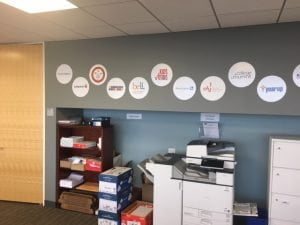 Liz: We come together and learn tools and frameworks to really think about how building relationships, managing conflict in a productive way, thinking about how do you take what you’re experiencing in the organization and think about it in a way that’s both productive and then shared across the organization. There’s different shared language that we can use when conflict comes up. We can talk about… we need to think about where we are in our ladder of influence, are we really thinking about the data that’s underneath the conversations or are we making assumptions. It’s a really amazing way to learn about these tools but we also spend a lot of time applying them as a group. Each time we meet, somebody writes a case about something that happened just recently in the organization about interaction they had with a colleague or it could be externally of somebody that you’re working with. Might be a challenging moment. You write down what exactly happened, verbatim, of just sharing and then spend an hour or two really digesting it as a group and working through applying the frameworks and then coming up with solutions of how this person could be better handling the situation like this next time or where they might go do tomorrow to help to write it. It’s been a really amazing opportunity to both learn some great tools and frameworks but also just built a support group internally to work through challenges real time.
Liz: We come together and learn tools and frameworks to really think about how building relationships, managing conflict in a productive way, thinking about how do you take what you’re experiencing in the organization and think about it in a way that’s both productive and then shared across the organization. There’s different shared language that we can use when conflict comes up. We can talk about… we need to think about where we are in our ladder of influence, are we really thinking about the data that’s underneath the conversations or are we making assumptions. It’s a really amazing way to learn about these tools but we also spend a lot of time applying them as a group. Each time we meet, somebody writes a case about something that happened just recently in the organization about interaction they had with a colleague or it could be externally of somebody that you’re working with. Might be a challenging moment. You write down what exactly happened, verbatim, of just sharing and then spend an hour or two really digesting it as a group and working through applying the frameworks and then coming up with solutions of how this person could be better handling the situation like this next time or where they might go do tomorrow to help to write it. It’s been a really amazing opportunity to both learn some great tools and frameworks but also just built a support group internally to work through challenges real time.
Adetola: One of the things that we started with in the Learning Through Relationships journey was looking at our behavioral footprint and trying to better understand not just how do we move in one-off situations at work but also what drives the way that you react to things when you are triggered, when you are caught off guard, when you are upset, when you are dealing with something else that no one has any context on and really understand what are patterns that you have and how do those influence the way that you interact with people and how can you once you better understand yourself in those things, how can you build on tools to better communicate what you’re struggling with? To learn how to be vulnerable, to advocate for yourself and what you need in order to be successful, to advocate for resources that you need to do the work at the optimal level and just to leverage the relationships, leverage the culture that you have where relationships are so important, how to understand how to better navigate that. I think I’ve learned a lot about myself but also how to better understand my colleagues, how to inquire effectively. I learned that there are good questions that really get to the core of things and not so good questions that can hinder your ability to learn, and through all these tools that we’re building and also the experience of having a cohort space to share and be open and honest and transparent. It’s impacted the work that I’m doing. It’s also impacted my personal life and the way that I’m able to communicate with my family and friends.
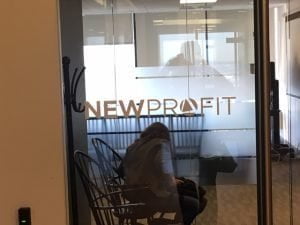 Amina: I think one of the things we do in just even whether it’s partner meetings, learning with each other, or staff meetings at large, we’re always trying to make sure we’re bringing two things. At one point, I remember we used to talk about failing harder. I’ve just like, talk about a time that you failed. Let’s talk about how you’ve learned about that. Then talk about something that you’re really proud of and excited about. So, we’ve brought both to staff meetings. We do a lot of, we call them the “whylights”. Why are you here? Why are you motivated about what you’re doing this past period? We’ve done those at staff meetings a lot. When we’re doing our team meetings, we often start with, “What’s something that’s been hurting you recently or really bothering you about the work or challenge? What’s something that you’re just really proud of and excited about?
Amina: I think one of the things we do in just even whether it’s partner meetings, learning with each other, or staff meetings at large, we’re always trying to make sure we’re bringing two things. At one point, I remember we used to talk about failing harder. I’ve just like, talk about a time that you failed. Let’s talk about how you’ve learned about that. Then talk about something that you’re really proud of and excited about. So, we’ve brought both to staff meetings. We do a lot of, we call them the “whylights”. Why are you here? Why are you motivated about what you’re doing this past period? We’ve done those at staff meetings a lot. When we’re doing our team meetings, we often start with, “What’s something that’s been hurting you recently or really bothering you about the work or challenge? What’s something that you’re just really proud of and excited about?
Shruti: One of the things that really struck me about that was that one of the terms that kept on coming up over and over again and was highlighted as a theme was unsatisfied. I say that because we are really really tenacious about getting to the outcomes that we want to get to. That lack of satisfaction is actually what drives our urgency and the need to do our work.
Adetola: Probably my proudest moment at New Profit was being heralded as the crab-walking champion at staff Olympics a couple of years ago. There have been so many moments where the organization has really encouraged everyone to pause what they’re doing and just come together and just have community and eat food that’s often the thing that brings people together when there is food of some sort. But you often end up learning a lot, just an observation about people when people are not just focused on the work, and they’re just focused on connecting and being together. That, for me, ends up help in giving me insight on how to better relate to folks. When people are not just competitive but where they get intense and where they draw their energy, my observations around that actually help me better understand people.
Kim: I think in some ways, the most traditional of things that we do are in some ways the most future-oriented in the sense of paying incredible attention to building capabilities around relationships and communication and empathy and the ability to think strategically and to give feedback and all of those things. I would hang my hat on those things for the future. At the same time, our ability to adapt and ask hard questions is letting us think about the next generations of entrepreneurial leaders in some really different ways.
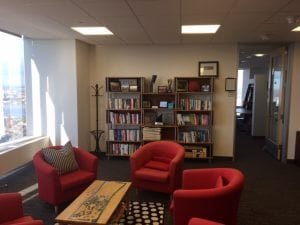 Kevin: The second is a bit more of an in a professional development growth side. That is New Profit is a place where there is not a single path to what you’re going to do next. And there are many examples of individuals who started as executive assistants within the organization who are now running functions at New Profit both formerly and currently. I’ve been here nine years. I’ve had four or five different jobs. I’ve had the same number of different managers. It is a place where you have a chance to explore different opportunities, to grow in different ways. And because I do think we have a lot of the deep caring and relationships, people talk so much about so far, that that enables people to really want to invest in someone’s professional development, give them opportunities to grow and learn and so that’s one thing that I’ve just really valued here on the professional development growth trajectory side is the opportunity to learn in lots of different places, to test new skills, to experiment with new things that you might not have done before. New Profit can really be a place where you can do that without fear and really benefit from the support that others offer you in coaching to succeed.
Kevin: The second is a bit more of an in a professional development growth side. That is New Profit is a place where there is not a single path to what you’re going to do next. And there are many examples of individuals who started as executive assistants within the organization who are now running functions at New Profit both formerly and currently. I’ve been here nine years. I’ve had four or five different jobs. I’ve had the same number of different managers. It is a place where you have a chance to explore different opportunities, to grow in different ways. And because I do think we have a lot of the deep caring and relationships, people talk so much about so far, that that enables people to really want to invest in someone’s professional development, give them opportunities to grow and learn and so that’s one thing that I’ve just really valued here on the professional development growth trajectory side is the opportunity to learn in lots of different places, to test new skills, to experiment with new things that you might not have done before. New Profit can really be a place where you can do that without fear and really benefit from the support that others offer you in coaching to succeed.
Sam: I’ve tried to apply that to the way that we run our team. I frankly just think that the more I can get out of the way, provides that backbone and foundation of learning for my team the more that I can get out of the way and let them lead, the better that we’re going to do.
Talking about the impact and influence of our current CEO, Vanessa Kirsch. I have never in my career worked with a person like her, and I doubt I ever will again. She is a different type of thinker in a way that has influenced the culture and the growth and evolution, basically everything that happens here. She never looks at a problem in a cut-and-dry way. She never looks at a person in a cut-and-dry way. As she has said many times part of this has to do with her being dyslexic and the journey that she has been on to be successful in a world that basically told her when she was young, that she had no future. That has driven her as a person and as a leader I think in pretty profound ways and it forces everyone here to think differently about how to get to the end goal and that’s a really good thing. It’s not formulaic here. It’s not pre-ordained. It is a beautiful and messy process sometimes to solve problems.
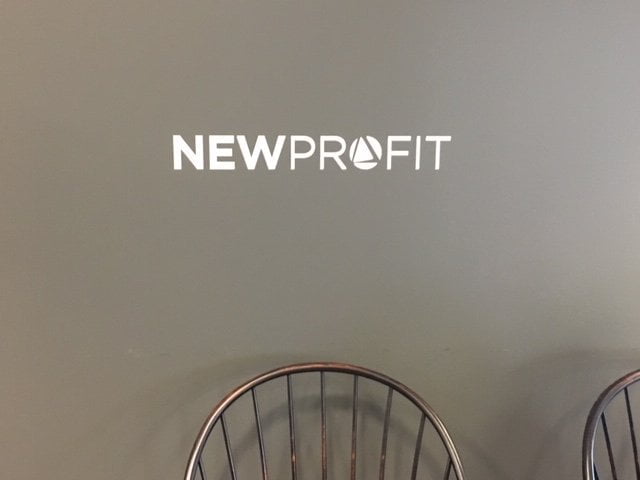
Denver: I’d like to thank all those who participated in this piece: Sam Hiersteiner, Kim Syman, Amina Fahmy, Shruti Sehra, Liz Leberman, Kevin Greer, and Adetola Olatunji. To hear this again, read the transcript or see pictures of the participants and the New Profit offices, simply go to denver-frederick.com
The Business of Giving can be heard every Sunday evening between 6:00 p.m. and 7:00 p.m. Eastern on AM 970 The Answer in New York and on iHeartRadio. You can follow us @bizofgive on Twitter, @bizofgive on Instagram and at http://www.facebook.com/BusinessOfGiving

